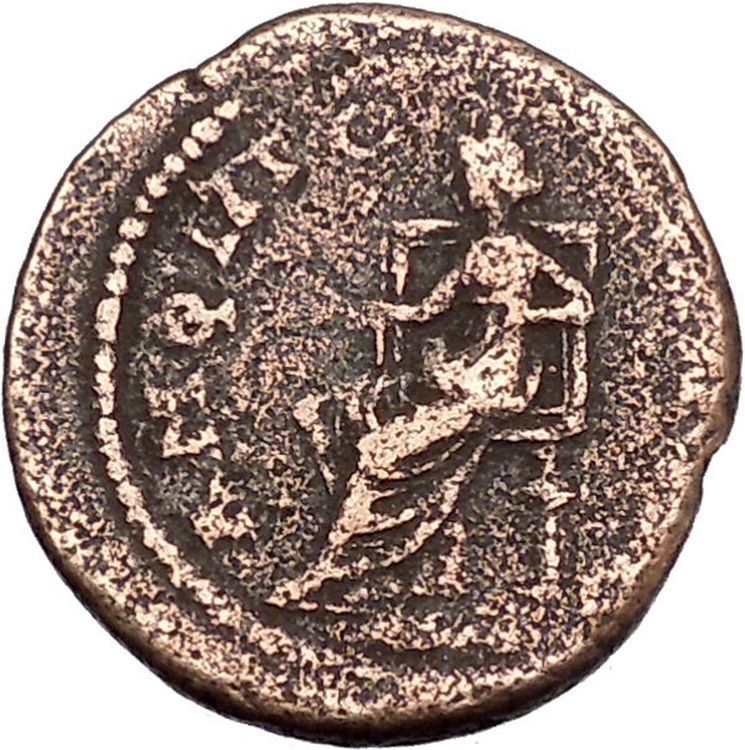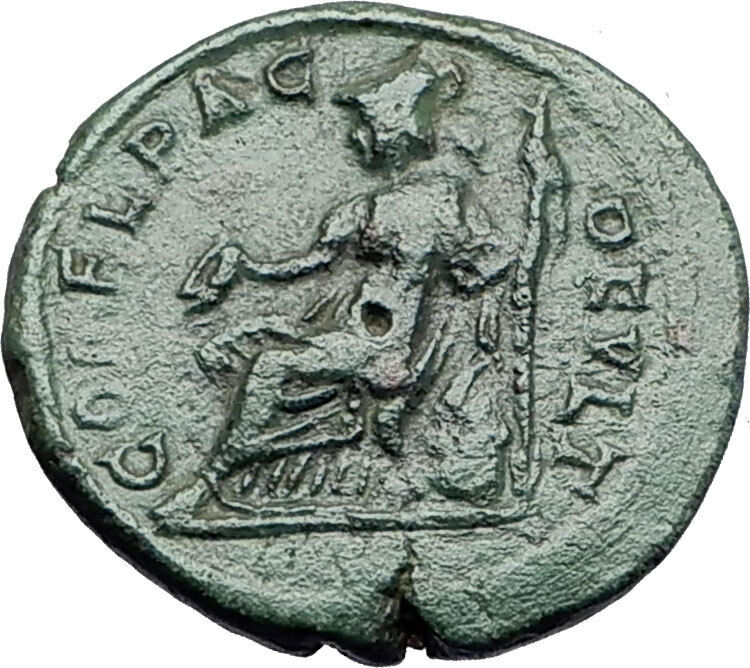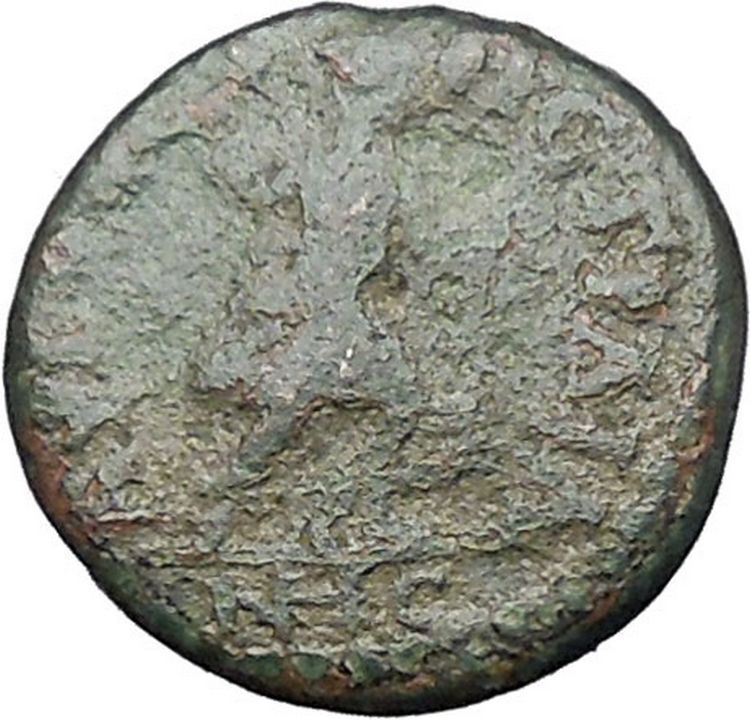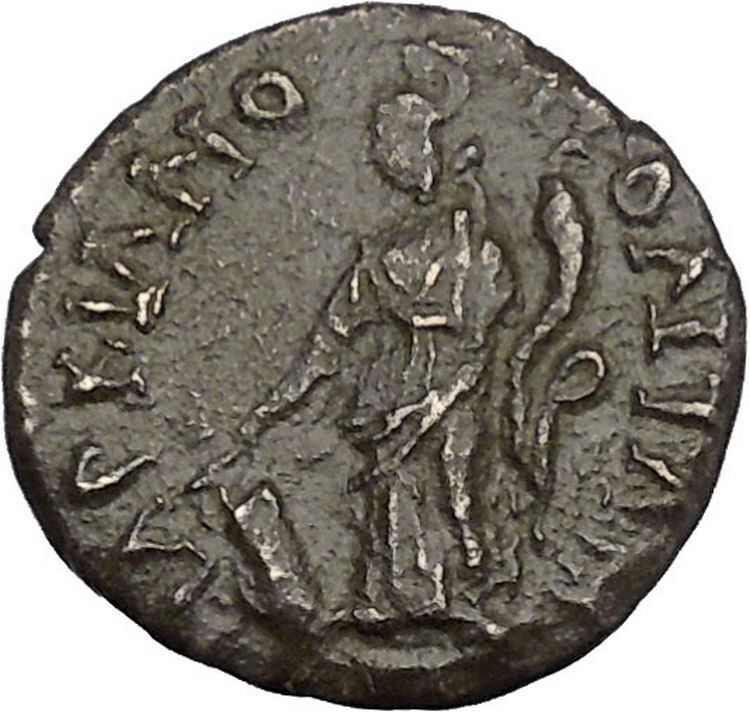|
Gordian III –
Roman Emperor
: 238-244 A.D. –
Gordian III & Tranquillina
Bronze Tetrassarion 26mm (10.33 grams) of
Anchialus
in
Thrace
Reference: AMNG I –; Varbanov 725 var. (obv. legend)
AVT K M ANT ΓOPΔIANOC AVΓ CЄB TPAHKVΛEINA, laureate draped and cuirassed bust of
Gordian III on left facing right toward draped bust of Tranquillina facing left
wearing stephane on right.
ΟVΛΠΙΑΝΩΝ AГХIAΛEΩN,
Nemesis
standing left holding rod; wheel to left.
You are bidding on the exact
item pictured, provided with a Certificate of Authenticity and Lifetime
Guarantee of Authenticity.
In
Greek mythology
, Nemesis (Greek,
Νέμεσις), also called Rhamnousia/Rhamnusia (“the
goddess
of
Rhamnous
“) at her sanctuary at
Rhamnous
, north of
Marathon
, was the spirit of divine
retribution
against those who succumb to
hubris
(arrogance before the gods). The Greeks
personified vengeful
fate
as a remorseless goddess. The name
Nemesis is related to the
Greek
word νέμειν [némein], meaning “to give
what is due”. The
Romans
equated the Greek Nemesis with
Invidia
. (Aronoff
2003).
“Nemesis” is now often used as a term to describe one’s worst
enemy
, normally someone or something that is
the exact opposite of oneself but is also somehow similar. For example,
Professor Moriarty
is frequently described as
the nemesis of
Sherlock Holmes
.
Pomorie (Bulgarian:
Поморие; formerly known as Αγχίαλος
Anchialos in
Greek
, Anchialus in
Latin
) is a town
and seaside resort in southeastern
Bulgaria
,
located on a narrow rocky peninsula in
Burgas Bay
on the southern
Bulgarian Black Sea Coast
. It is located in
Burgas Province
20 km from
Burgas
and 18
km from Sunny Beach
. The ultrasaline lagoon
Lake
Pomorie
, the northernmost of the
Burgas
Lakes
, lies in the immediate proximity. It is the center of
Pomorie Municipality
.
Pomorie is an ancient city and today an important tourist destination. As of
September 2005 it has a population of 14,600 and the mayor is Petar Zlatanov. It
lies at
 42.55°N 42.55°N
27.65°E /
42.55; 27.65
/ 42°33′N
27°39′E.
Possibly founded in the 5th or 4th century BC as a colony of Apollonia (today
Sozopol
),
Anchialos was mentioned in
Strabo
‘s
Geographica as a small town. It was briefly captured by Messembria (Nesebar)
in the 2nd century BC, but reconquered by Apollonia and its fortified walls
destroyed. The name Anchialos is derived from
Ancient Greek
“anchi-” (“near, close to”) and “als-” (either “salt” or a
poetic and uncommon word for “sea”).
The western Black Sea coast was ultimately conquered by the
Romans
under
Marcus Licinius Crassus
in 29-28 BC after continuous campaigns in the area
since 72-71. The fortified wall was meanwhile rebuilt, as evidenced by
Ovid in 9 AD en
route to
Tomis
. In the early 1st century AD Anchialos was the centre of a
strategia of the vassal
Odrysian kingdom
, and the town had a
Thracian
population in the 6th century AD according to the early
Byzantine
historian
Procopius
.
As the Odrysian kingdom’s self-independence was abolished in 45 AD, Anchialos
became part of the
Roman province
of
Thrace
and was
formally proclaimed a city under Emperor
Trajan
. At the
time the city controlled a vast territory bordering that of Augusta Trajana (Stara
Zagora) and reaching the
Tundzha
to
the west, bordering that of Messembria to the north and the southern shore of
Lake
Burgas
to the south. Anchialos acquired the appearance of a Roman city and
thrived considerably in the 2nd and 3rd century under the
Severan Dynasty
, seving as the most important import and export station of
Thrace.
Furia Sabinia Tranquillina or Sabinia Tranquillina (ca 225 –
aft. 244) was the
Empress of Rome
and wife of Emperor
Gordian III
. She was the young daughter of the
Praetorian
Prefect
Timesitheus
by an unknown wife.
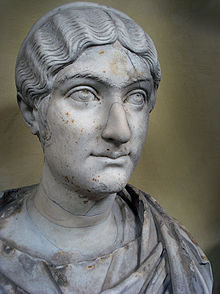
In
241 her father was appointed the head of the Praetorian Guard by the Roman
Emperor Gordian III
. In May that year, Tranquillina had
married Gordian. She became a Roman Empress and received the honorific title of
Augusta. Her marriage to Gordian was an admission by the young emperor of
both political indispensability of Timesitheus and Tranquillina’s suitability as
an empress.
In 243, Tranquillina’s father suddenly died and was replaced with
Philip the Arab
, as head of the
Praetorian Guard
. When Gordian was killed in
February 244, Philip became the new emperor. Tranquillina survived her husband.
She had no sons with him. Christian Settipani suggests that they had a daughter,
(Furia) (b. ca 244), most likely posthumous, who married (Marcus Maecius Orfitus)
(b. ca 245), son of Marcus Maecius Probus (b. ca 220), married to Pupiena Sextia
Paulina Cethegilla (b. ca 225), paternal grandson of
Marcus Pomponius Maecius Probus
and maternal
grandson of
Marcus Pupienus Africanus
(son of his protector
Emperor
Pupienus Maximus
) and wife Cornelia Marullina,
by whom she had issue.
Marcus Antonius Gordianus Pius (January
20, 225
–
February
11
, 244
),
known in
English
as Gordian III,
 was was
Roman
Emperor
from 238 to 244. Gordian was the son of
Antonia Gordiana
and his father was an unnamed Roman Senator who died before
238. Antonia Gordiana was the daughter of Emperor
Gordian I
and younger sister of Emperor
Gordian II
.
Very little is known on his early life before becoming Roman Emperor. Gordian
had assumed the name of his maternal grandfather in 238.
Following the murder of emperor
Alexander Severus
in Moguntiacum (modern
Mainz
), the
capital of the
Roman province
Germania Inferior
,
Maximinus Thrax
was acclaimed emperor, despite strong opposition of the
Roman senate
and the majority of the population. In response to what was
considered in Rome as a rebellion, Gordian’s grandfather and uncle, Gordian I
and II, were proclaimed joint emperors in the
Africa Province
. Their revolt was suppressed within a month by Cappellianus,
governor of Numidia
and a loyal supporter of Maximinus Thrax. The elder Gordians died,
but public opinion cherished their memory as peace loving and literate men,
victims of Maximinus’ oppression.
Meanwhile, Maximinus was on the verge of marching on Rome and
the Senate elected
Pupienus
and Balbinus
as joint emperors. These senators were not popular men and the population of
Rome was still shocked by the elder Gordian’s fate, so that the Senate decided
to take the teenager Gordian, rename him Marcus Antonius Gordianus as his
grandfather, and raise him to the rank of
Caesar
and imperial heir.
Pupienus
and Balbinus
defeated Maximinus, mainly due to the defection of several
legions
,
namely the
Parthica II
who assassinated Maximinus. But their joint reign was
doomed from the start with popular riots, military discontent and even an
enormous fire that consumed Rome in June 238. On
July 29
,
Pupienus and Balbinus were killed by the
Praetorian guard
and Gordian proclaimed sole emperor.
Rule
Due to Gordian’s age, the imperial government was surrendered
to the aristocratic families, who controlled the affairs of Rome through the
senate. In 240,
Sabinianus
revolted in the African province, but the situation was dealt quickly. In 241,
Gordian was married to Furia Sabinia
Tranquillina
, daughter of the newly appointed praetorian prefect,
Timesitheus
. As chief of the Praetorian guard and father in law of the
emperor, Timesitheus quickly became the de facto ruler of the Roman
empire.
In the 3rd century, the Roman frontiers weakened against the
Germanic tribes across the
Rhine
and
Danube
, and the
Sassanid
kingdom across the
Euphrates
increased its own attacks. When the Persians under
Shapur I
invaded Mesopotamia
, the young emperor opened the doors of the
Temple of Janus
for the last time in Roman history, and sent a huge army to
the East. The Sassanids were driven back over the Euphrates and defeated in the
Battle of Resaena
(243). The campaign was a success and Gordian, who had
joined the army, was planning an invasion of the enemy’s territory, when his
father-in-law died in unclear circumstances. Without Timesitheus, the campaign,
and the emperor’s security, were at risk.
Marcus Julius Philippus, also known as
Philip the Arab
, stepped in at this moment as the new Praetorian Prefect and
the campaign proceeded. In the beginning of 244, the Persians counter-attacked.
Persian sources claim that a battle was fought (Battle
of Misiche) near modern
Fallujah
(Iraq)
and resulted in a major Roman defeat and the death of Gordian III.
Roman sources do not mention this battle and suggest that Gordian died far away,
upstream of the Euphrates. Although ancient sources often described Philip, who
succeeded Gordian as emperor, as having murdered Gordian at Zaitha (Qalat es
Salihiyah), the cause of Gordian’s death is unknown.
Gordian’s youth and good nature, along with the deaths of his
grandfather and uncle and his own tragic fate at the hands of another usurper,
granted him the everlasting esteem of the Romans. Despite the opposition of the
new emperor, Gordian was deified by the Senate after his death, in order to
appease the population and avoid riots.
|







 was
was